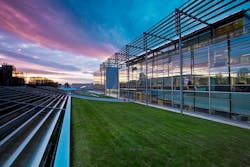The coronavirus pandemic took a second-quarter financial toll at Sweden’s Fagerhult Group, as sales fell by 15.5% and pre-tax profits tumbled by 17.5% while buoyed by cost cutting — some layoffs are coming — and by government support amid the health crisis.
During the quarter the SEK (Swedish krona) 7.85 billion ($890 million) company, owner of 13 brands, decided to withdraw from South Africa, where its Lighting Innovations group had been already been struggling prior to the global coronavirus outbreak.
But Habo-based Fagerhult also reopened many of the factories and commercial offices that it had temporarily closed. The re-openings included factories operated by iGuzzini in Italy, iGuzzini’s Sistemalux in Canada, Whitecroft in the UK, LED Linear in Germany, and Lighting Innovations. All are operating at a reduced capacity.
In yet another expression of hope by the lighting industry in the Internet of Things (IoT), Fagerhult opened a second development center for its Organic Response technology, the connected lighting controls and software overseen by Fagerhult’s Melbourne, Australia-based OR Technologies.
The new IoT facility, which Fagerhult refers to as a “competence center,” is in Linköping, Sweden. OR provides its technology to brands within the Fagerhult Group, which include Fagerhult, iGuzzini, Whitecroft, ateljé Lyktan, LED Linear, WE-EF, LTS, Arlight, Eagle Lighting, Lighting Innovations (for the time being), Designplan Lighting, i-Valo, and Veko.
The lighting industry in general has for several years been pinning big hopes on IoT lighting, although it has been slow to take off. Industry leader Signify has declared that the current economic slowdown marks a good opportunity to educate the market on the IoT. Fagerhult’s IoT implementations have included a lighting-based security operation in partnership with security giant Securitas at a Swedish biotech park.
In the second quarter ending June 30, Fagerhult Group sales fell to SEK 1.73B ($200M) from SEK 2.1B ($240M) in the same quarter a year earlier, and pre-tax profits fell to SEK 128.2M ($14.5M) from SEK 155.4B ($17.6M).
The company cited COVID-19 for the decline.
“Unavoidably, the reduced market activity levels and lockdowns had a negative impact on the Group’s trading performance in the quarter,” it said in a press release. “The Covid-19 impact was most difficult during late March and April with May and June being more positive as a new normal level was established and full capability returned.”
Fagerhult described its operating profit and cash flow during the quarter as “relatively strong,” with CEO Bodil Sonesson noting that “we have a strong balance sheet and a healthy liquidity situation” which she attributed to cost cutting and other measures including a focus on “cash generating activities.” Operating cash flow leapt by nearly 60% to SEK 230.2M ($26.5M).
Although the company has reopened factories, many sales offices remain closed with staff working from home in Fagerhult territories including Southern Europe, the UK, the US, the Middle East, Russia, Benelux & Switzerland, Australia, and New Zealand.
Cost cutting that began in March continued, with the company making SEK 86M ($9.9M) in cuts on top of SEK 69M ($7.9M) reductions in the first quarter. Some layoffs are coming in the third quarter, including the planned loss of 100 jobs at the Fagerhult brand, called Fagerhults Belysning. The overall Fagerhult Group employee count in the second quarter averaged 4579. And while opening a new IoT center, the group said it has temporarily suspended all new capital investments “other than for critical developments and investments.”
It has not reinstated the SEK 1.50 ($0.17) shareholder dividend which it withdrew in April.
Government pandemic support totaled SEK 37.6M ($4.3M).
The company said it is working closely with suppliers and with lenders, and that it increased its cash and undrawn credit facilities from SEK 2.16M ($248,424) at 30 March to SEK 2.22M ($255,325), from SEK 2.2M ($253,025) at the end of the first quarter.
Fagerhult recently reorganized its financial reporting, changing from geographic lines to a structure based on four product categories: Collection, Premium, Professional, and Infrastructure.
Collection houses the company’s architectural and design brands for both indoor and outdoor use globally and consists of ateljé Lyktan, iGuzzini, LED Linear, and WE-EF. Premium has more of a European slant and includes chiefly indoor products for specifiers, partners, and bespoke installations, with the Fagerhult and LTS brand and also with Organic Response responsibilities. Professional focuses on indoor applications in markets local to the brand and also involves specifiers and bespoke, including the brands Arlight, Eagle Lighting, Lighting Innovations, and Whitecroft. Infrastructure targets environments where durability and robustness is key and includes Designplan Lighting, i-Valo, and Veko.
In the quarter, Collection had the top revenue at SEK 810.7M ($93.2M), followed by Premium at SEK 611.7M ($70.3M), Professional at SEK 220.1M ($25.3M), and Infrastructure at SEK 164.8M ($18.9M).
Professional will not include Lighting Innovations for much longer. Fagerhult announced that it is “investigating different exit options” for the South African business, which at the end of 2019 had 144 employees and represented 1.1% of Fagerhult sales.
“The entity has been increasingly loss making in recent years,” Fagerhult said. “The South African market has been challenging and continues not to develop as expected. As a result, we have decided to focus our investments on more attractive growth opportunities. We will either find a buyer or close the business and liquidate the assets.”
Meanwhile on a Fagerhult Group level, new orders in the second quarter were down 24%, at SEK 1.66M ($190,865M) compared to SEK 2.2M ($252,959M) a year earlier.
“The reduced market activity was felt in all business areas with the highest impact in countries where the government regulated lockdowns were the strictest: Italy, France, Spain, the UK and USA,” the company said. “In the last few weeks we experienced a flattening of order intake, a positive sign that the market reduces no further.” But it declined to make any specific projections.
“Whilst we report a somewhat more stable situation, there continues to be uncertainty in the market, especially with the growing concerns of a second wave of Covid-19 with localized lockdowns now appearing.” the company stated. “Consequently, we maintain our view not to provide further forward looking guidance for the balance of 2020.”
MARK HALPER is a contributing editor for LEDs Magazine, and an energy, technology, and business journalist ([email protected]).
For up-to-the-minute LED and SSL updates, why not follow us on Twitter? You’ll find curated content and commentary, as well as information on industry events, webcasts, and surveys on our LinkedIn Company Page and our Facebook page.





